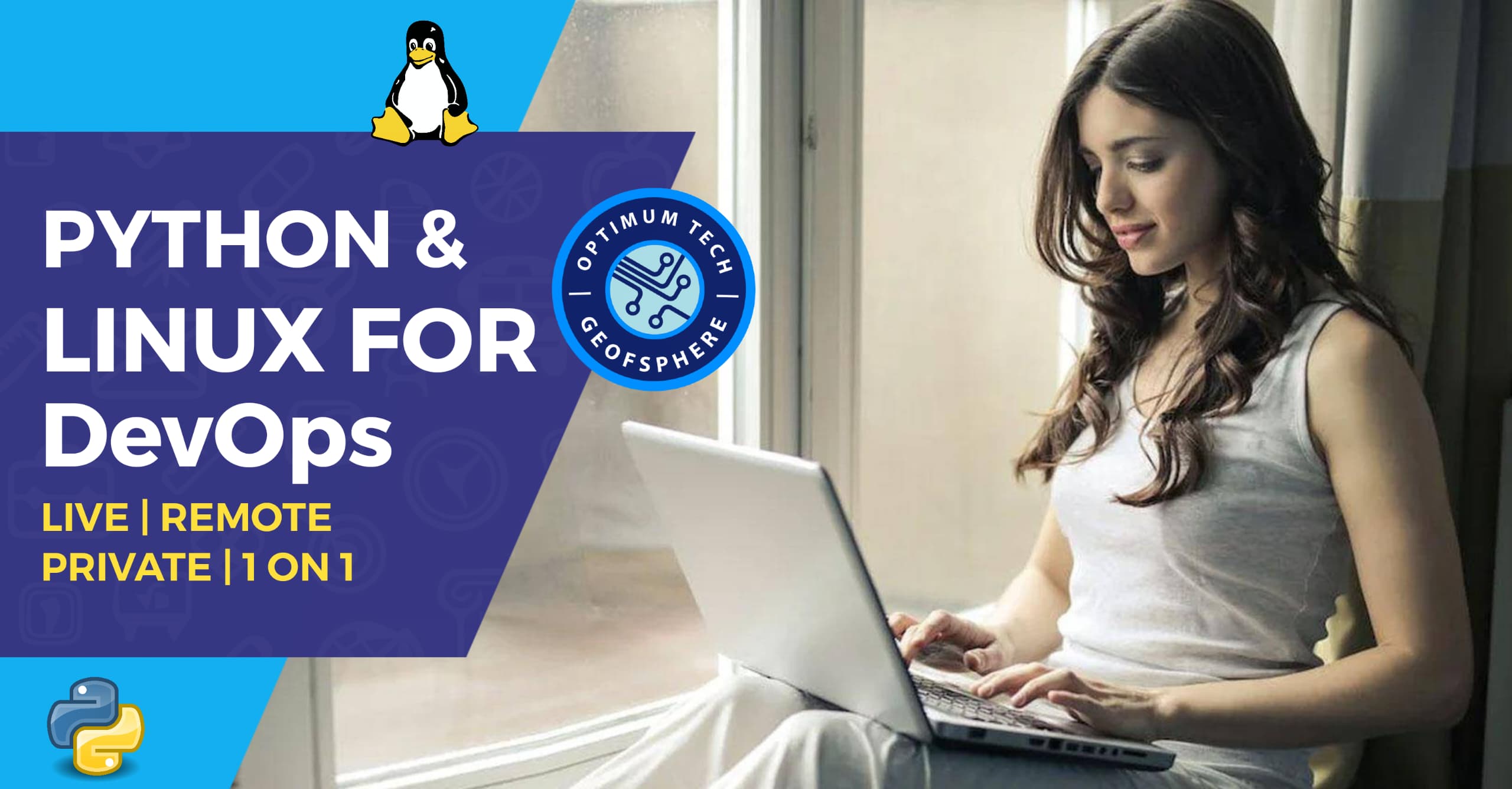Python And Linux For DevOps Training
Original price was: ₦160,000.00.₦130,000.00Current price is: ₦130,000.00.
Master the essential Linux for DevOps skills with this flexible, remote training. Learn shell scripting, system tools, file permissions, monitoring, and more. Build real-world projects and gain confidence as you prepare for a DevOps role — all at your own pace.
Description
THE ULTIMATE PYTHON AND LINUX FOR DEVOPS TRAINING.
Your journey as a DevOps professional isn’t a sprint—it’s more like a marathon. But you can start making it shorter and smarter with this course.
We’ve carefully crafted a curriculum just for you (outlined below), so be sure to go through it in detail.
With our 100% remote learning approach, distance is never a barrier—and your tight schedule won’t get in the way either. Even with no prior experience, you’ll be building real-world projects in just a few weeks.
EASE OF LEARNING AND FLEXIBILITY
Continue your training even when you travel to a new location.
Each session is all about you—ask any question without feeling shy.
Schedule your classes at times that work best for you without disrupting your other priorities.
And yes, you can even learn from your bed—as long as you’re following along.
This one-on-one Linux for DevOps training allows you to learn at your own pace, build advanced projects, and gain hands-on experience.
Automatic Level One Membership For Life
By purchasing this course, you earn automatic Level One Tech Membership on our website and digital channels.
Terms and conditions apply.
Course Curriculum
Student Level: Beginner to Advanced
Instructor: Geoff .N.
Objective: To build strong foundational Linux skills relevant to modern DevOps roles and responsibilities.
Linux For DevOps Section:
1. Linux Fundamentals
-
Understanding Linux distributions and the open-source ecosystem
-
Filesystem hierarchy and standard directories
-
File and directory manipulation (
ls,cd,mkdir,cp,mv,rm, etc.) -
Viewing and editing file content (
cat,less,more,head,tail) -
File permissions and ownership (
chmod,chown,umask) -
Creating and managing users and groups
2. Process and Service Management
-
Managing running processes (
ps,top,htop,kill,nice,renice) -
Understanding background and foreground jobs (
&,jobs,fg,bg) -
Service management with
systemdandsystemctl -
Viewing and controlling startup services
3. Shell Scripting with Bash
-
Basic shell scripting: variables, conditionals, loops, functions
-
Writing automation scripts for common system tasks
-
Using
cronandatfor job scheduling -
Debugging scripts and best practices
4. Networking Essentials
-
Understanding IP addressing and subnetting basics
-
Essential commands:
ip,ifconfig,ping,traceroute,netstat,ss,curl,wget,nslookup,dig -
Diagnosing and troubleshooting connectivity issues
-
Introduction to firewalls and port management
5. Security and Access Control
-
Secure Shell (SSH) setup and key-based authentication
-
Managing
sudoprivileges -
File and directory permission auditing
-
Introduction to firewalls (
ufw,iptables) -
Overview of SELinux/AppArmor
6. Package Management
-
Understanding packages and repositories
-
Working with APT (Debian/Ubuntu)
-
Working with YUM/DNF (RHEL/CentOS/Fedora)
-
Installing, updating, removing software
-
Managing third-party software
7. Logs and System Monitoring
-
Exploring log files in
/var/log -
Viewing and filtering logs with
tail,grep,awk,less -
Log rotation and retention (
logrotate) -
Monitoring system performance:
top,htop,vmstat,iostat,iotop,free -
Disk usage and health:
df,du,lsblk,smartctl
Post Training Recommendation(For Future Learning):
Further tools, cloud technologies, and CI/CD integrations will be recommended after training based on
progress and interests.
Python Programming Section:
1. Master dynamic typing concepts in Python
2. Understand Python syntax and comments
3. Learn about indentation and writing Python statements
4. Assign variables and understand identifiers in Python
5. Explore Python scope and namespaces
6. Get introduced to Python data types
7. Work with Python numbers and operators
8. Manipulate strings in Python
9. Create and manage lists in Python
10. Construct and access tuples
11. Create and manipulate dictionaries
12. Understand and use Python sets and Boolean data types
13. Test your knowledge with a data types quiz
14. Solve data types coding challenges
15. Write conditional statements: if, else, elif
16. Use for and while loops in Python
17. Apply practical use cases of loops
18. Learn list comprehensions in Python
19. Handle errors with try and except blocks
20. Define functions and use built-in functions like enumerate, range, and sorted
21. Work with lambda, map, and filter functions
22. Implement recursion and understand *args and **kwargs
23. Tackle beginner-level coding challenges
24. Complete your first personalized project
25. Dive into Object-Oriented Programming (OOP) in Python
26. Complete your second personalized project
27. Understand Python match patterns and case statements
28. Perform advanced file manipulations
29. Automate system tasks with Python scripting
– Use Python to manage files, processes, and OS-level tasks via os, subprocess, and shutil
30. Learn how to consume APIs using requests and similar tools
– Practice using Postman to understand APIs
31. Work with modules and packages
32. Explore common Python libraries
33. Take on more intermediate-level coding challenges
34. Complete your third personalized project
35. Learn Git, basic Git commands, and use GitHub
36. Work with generators and decorators in Python
37. Send emails using Python
38. Use Python regular expressions (REGEX)
39. Get introduced to web scraping
40. Learn the basics of cryptography
41. Enhance your skills to become a better programmer
42. Complete your fourth personalized project
43. Get introduced to algorithm challenges
44. Choose your specialized path in Python programming
45. Receive a training certificate upon completion
Post-Training Recommendation:
Specialized Python skills for DevOps such as testing, CLI tools, YAML processing, and automation will be
recommended based on your progress during the training.
Training Timing:
This is a flexible course; however, that doesn’t mean there is no stipulated time frame for completion. Please see the available time limits and options below:
-
Maximum training hours per day: 2
-
Minimum training days per week: 2
-
Maximum training days per week: 3
This is a 100% remote, live online Python and Linux for DevOps training, and the software for classes currently is google meet app. Kindly read site terms and condition as well for more information.
For more information and free consultation, chat with a tutor on WhatsApp right away.






Reviews
There are no reviews yet.